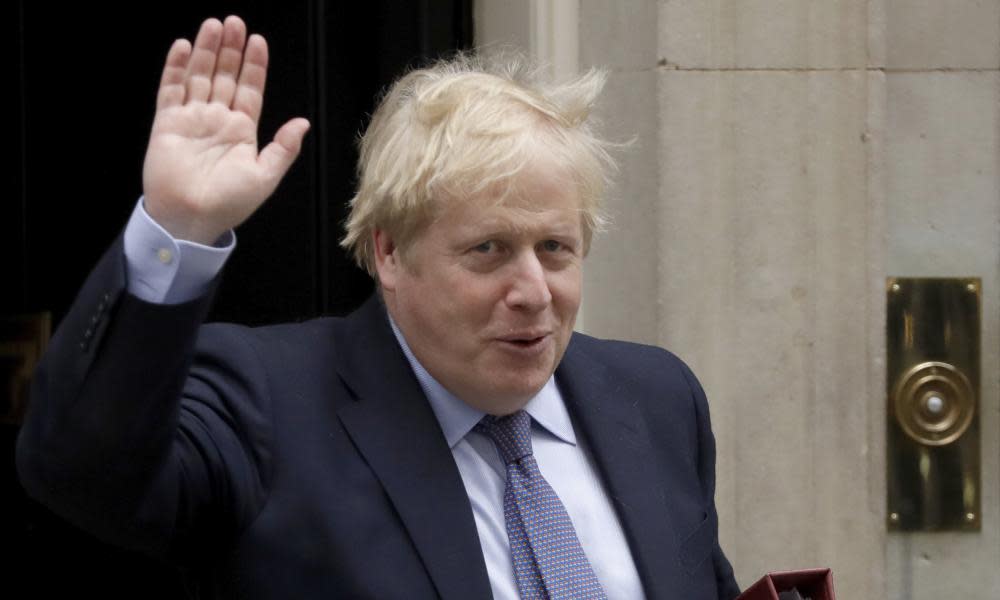UK says it will consider walking away from Brexit talks in June

Boris Johnson is asking the EU for a Canada-style trade deal but will consider whether to walk away from talks in June and prepare for an “orderly” exit from the transition period.
Setting out its negotiating mandate for EU talks, Downing Street said it wanted “regulatory freedom” from the EU and would not accept any role for the European court of justice (ECJ) in dispute resolution mechanisms.
The government said it hoped to achieve “the broad outline” of an agreement by June, with the aim of finalising a deal by September. If not enough progress had been made by June, the government would “need to decide whether the UK’s attention should move away from negotiations and focus solely on continuing domestic preparations to exit the transition period in an orderly fashion”.
The threat sets the UK on course for leaving the transition period on World Trade Organization (WTO) terms at the end of the year unless either or both sides make major concessions within four months.
While the UK wants to be free to set its own rules, the EU wants some degree of regulatory alignment, with the option of imposing tariffs if one side reneges. It would also like a role for the ECJ.
Downing Street says this would restrict the UK’s sovereignty more than in the EU’s offers to other nations such as Japan, Canada and the US.
The UK’s negotiating mandate asks for:
A liberalised market for trade in goods, with no tariffs, fees, charges or quantitative restrictions on trade in manufactured or agricultural products.
Competition and subsidies to not be subject to the final agreement’s dispute resolution mechanism, which had been previously signalled in the political declaration.
A separate agreement on fisheries that would allow for annual negotiations on access to each other’s waters, including allowable catch and shares. The EU wants fishing to be considered as part of the overall agreement.
An agreement on equivalence on financial services to be decided before the end of June.
No participation in the European arrest warrant but a similar extradition agreement as the EU has with Iceland and Norway – a position likely to cause alarm among law enforcement bodies.
Related: Brexit: UK negotiating objectives for trade with EU, in a nutshell
Addressing the House of Commons, Michael Gove, the Cabinet Office minister in charge of Brexit planning, said he was “confident that those negotiations will lead to outcomes which work for both the UK and the EU”.
However, he added, parliament, Brussels and the British people “should be in no doubt – at the end of the transition period, on December 31, the United Kingdom will fully recover its economic and political independence”.
“We want the best possible trading relationship with the EU, but in a pursuit of a deal, we will not trade away our sovereignty.”
Whatever the outcome of the talks, businesses have been warned to expect disruption at the border from 1 January 2021 because the UK will not extend the transition period and will therefore be leaving the EU’s single market and customs union. It is estimated that at least 50,000 new customs officials will be needed to cope with the changes.
However, leaving on WTO terms would mean trade tariffs and barriers on a large scale.
On the issue of Northern Ireland, Gove insisted the government “respects the protocol” in the withdrawal agreement, which leaves Northern Ireland in some alignment with the EU on customs.
This suggests there will need to be some checks on goods crossing the Irish Sea, even though the UK government has repeatedly said there will not, under any circumstances, be any new border infrastructure between Northern Ireland and the rest of the UK. Experts have questioned whether this is possible.
Paul Blomfield, a shadow minister for exiting the EU, said the offer was “underwhelming” and pressed the government on why there was no commitment to publishing an economic impact assessment of the deal it was seeking with the EU.
Pete Wishart, a Scottish National party spokesman, said the offer to the EU was a “load of bunkum, baloney and codswallop”.
“This is nothing other than a routemap to the cherished no-deal – the real ambition of these Brexit zealots. They’re even now prepared to break international law in order to achieve this outcome.”
Frances O’Grady, the Trades Union Congress general secretary, accused the government of planning to water down people’s employment rights and safety standards.
“The government is recklessly endangering working people’s jobs and rights,” she said. “By abandoning the level playing field, ministers are deliberately undermining important protections, like the right to paid holidays and safe limits on working hours.”
The UK rejected the EU’s negotiating mandate when it was set out on Tuesday. Downing Street said it did not recognise the need for a “level playing field” for competition.
It said Brussels was trying to impose “onerous commitments” that would undermine the UK’s legal autonomy and right to set its own regulations.
In return, Michel Barnier, the EU’s chief negotiator, told reporters on Tuesday that the EU would “not conclude an agreement at any price”.
He said if there was to be any chance of a deal by the end of the year, there could be no “backtracking” by the UK on past commitments made in the withdrawal agreement and the accompanying political declaration.

 Yahoo News
Yahoo News 
